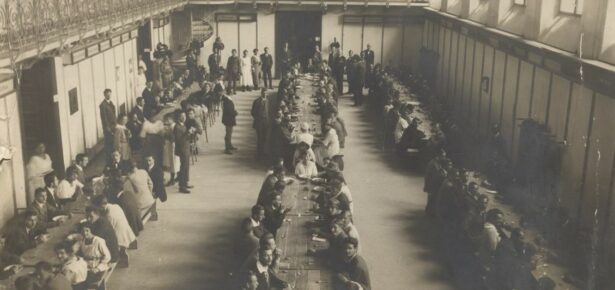
In late 1920 Vienna, an old café basement, recently used as a storeroom for coal, was transformed; long tables, covered in white linen and decorated with flowers, were set up, and 170 people dined there daily. This was the scene at the intellectual kitchen of the University of Vienna, a site where, in the midst of famine conditions where one scholar described feeling like ‘a worm crawling round a dung heap’, academics dined with their peers exclusively, with no places set for spouses, children or siblings. Funded by American philanthropy, the kitchen allowed ‘grizzly-bearded, spectacled gentlemen’ and ‘clean-shaven, keen-eyed young lecturers’ to come together to receive culinary and intellectual sustenance in a city ravaged by the effects of war and blockade. In many cities across central and eastern Europe, such scenes were common. Tables were laid for intellectuals alone, who were singled out for support by a range of humanitarian agencies, at a time of ubiquitous need – but why them and why then?
The Great War and the conflicts that followed it in the early 1920s left intellectual life in ruins in many countries; sites of cultural value, such as libraries, schools, and churches, were destroyed in fighting; writers, teachers and artists were killed in battle and many others were displaced by rapidly shifting fronts; and the international exchange of people and ideas broke down. The conditions caused by warfare also posed a grave threat to life: famine and epidemic were rife in central and eastern Europe by 1919 and the Bolshevik Revolution and Russian Civil War led to a refugee crisis, while hyperinflation gripped countries like Germany and Austria. These events put millions of lives in Europe at risk and led to an unprecedented humanitarian effort to save lives.
Humanitarian crises often bring to mind the suffering of the most vulnerable in society; however, in post-1918 Europe, an unprecedented set of humanitarian initiatives took place that attempted to save the individuals and institutions that comprised European intellectual life. This version of humanitarianism not only provided food, clothes and medical aid to intellectuals at risk of death, but also supplied them with books, laboratory equipment and other materials so that they could continue their creative work and maintain a sense of social difference, as well as rebuilding institutions like libraries and universities that had been destroyed by the violence of total war. In the aftermath of war, a wide range of humanitarian agencies deemed it essential that not only were cultural sites rebuilt, but that the individuals who populated them could continue to produce new knowledge and teach future generations. This is the subject that I explore in my new book, Feeding the Mind: Humanitarianism and the Reconstruction of European Intellectual Life, 1919-33.
Intellectual relief differed from the general provision of humanitarian aid in this period through its selectiveness; intellectuals were chosen as being deserving of aid owing to their societal and cultural standing, often separately to the needs of others. In post-war Austria, Poland, and Russia, ‘intellectual kitchens’ were set up for the exclusive feeding of those deemed intellectuals. Intellectuals were also identified for special assistance among the hundreds of thousands of refugees displaced by the violence of the Russian Civil War; the League of Nations resolved in August 1921 that it was ‘especially desirable’ that ‘special protection and employment’ should be found for refugee Russian intellectuals. Across Europe, from Vienna to Berlin, Budapest to Warsaw, Paris to Odesa, and Belgrade to Moscow, there is much evidence of a similar emphasis on ensuring the wellbeing of those involved in intellectual and cultural pursuits.
Intellectual relief can be seen in its many guises across Europe in the early 1920s, but what did it mean? Such humanitarian activity constituted an important element of the quest for stability in post-war Europe; it was, in many cases, primarily directed towards new states in central and eastern Europe where democracies replaced deposed multi-ethnic empires. Here, the study of humanitarian aid offers a unique perspective on how western philanthropists and policy makers sought to build stable states through the work of intellectuals, not so much in terms of what they researched or wrote, but what they represented as figures who were deeply embedded in the pursuit and dissemination of knowledge and, in many cases, representative of middle-class interests. Intellectual relief was rarely explained or justified in political terms by those giving or receiving it; instead, many spoke of their fears of the collapse of ‘civilization’ and the implied spectre of the spread of Bolshevism. In the context of humanitarian aid, the deployment of the term ‘intellectual’ was rarely fixed and could encompass varying groups of people in different settings.
Post-First World War intellectual relief remains instructive from a modern-day perspective. Displacement, hunger, and cultural destruction have frequently accompanied violence in the twentieth and twenty-first centuries, while contemporary issues such as climate change are leading to the widespread movement of people – and threaten worse in the future. Moreover, we live in an age where basic truths are politicised and undermined as never before, meaning that the position of intellectuals and experts in their societies are contested in new and often troubling ways. International responses to the disasters and wars of the twenty first century have shown that intellectual life can, by making use of modern technologies, be assisted in new, creative and virtual ways. While the wider context and elitist language utilised one hundred years ago may have changed, it is clear that many of the wider issues raised in Feeding the Mind – namely, how societies ought to protect institutions and individuals concerned with the production of knowledge – will remain crucial challenges in the future.
Latest Comments
Have your say!